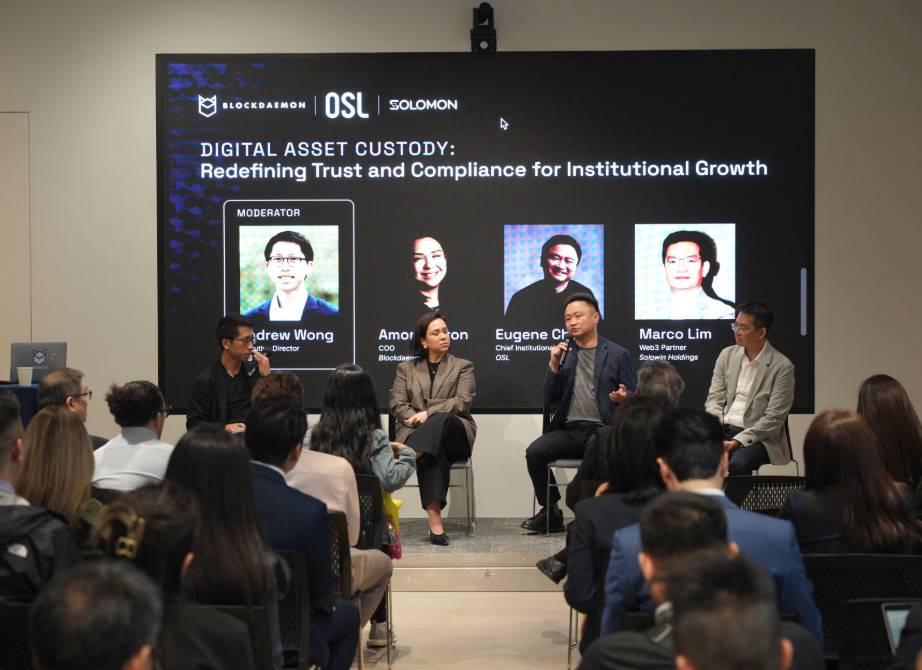Institutions are no longer asking whether to enter Crypto, but are more focused on how to enter Crypto.
Written by: OSL
On February 17, the Web3 Connect: An Institutional-Focused Forum, co-hosted by OSL, Blockdaemon, and Solomon, successfully concluded in Hong Kong. This summit brought together global regulatory experts, representatives from financial institutions, and technology pioneers to engage in in-depth discussions on topics such as digital asset custody, institutional blockchain applications, and compliance trends.
During the first panel discussion, OSL's Chief Institutional Business Officer (CIBO) Zhang Yinghua shared the latest upgrades to Hong Kong's digital asset regulatory framework and analyzed the new challenges and opportunities this change brings to institutional investors.

Blockchain "Infiltrating" Traditional Trade Systems: Stablecoins Driving an Efficiency Revolution
Firstly, OSL's Chief Institutional Business Officer (CIBO) Zhang Yinghua pointed out that with the popularity of stablecoins, more and more international trade companies are choosing them as cross-border payment tools to reduce exchange rate volatility risks and settlement costs and time.
For businesses, in scenarios with high payment frequency but lower individual amounts (such as retail payments or payroll settlements), there is often a desire for payment systems to provide efficient capital flow while also keeping costs low. However, the current blockchain technology architecture often requires customized development to adapt to different business processes and traditional system interfaces.
In practical use, stablecoins like USDT have already gone beyond merely serving cryptocurrency users and trading scenarios, deeply penetrating broader financial needs such as currency exchange, goods payment, remittances, and payroll payments. In this context, the market urgently needs a universal and cost-effective integrated development solution to reduce technical complexity and implementation costs, helping businesses, especially small and medium-sized participants, more easily access blockchain payment networks and obtain Web3 payment service support.
From this perspective, market participants like OSL, which possess compliant, secure, efficient, and diverse service capabilities—whether integrating Web3 payments into platform payment options or providing custody, trading, and settlement for stablecoins, Bitcoin, and other digital assets—can offer important support that is low-cost, secure, and convenient.
Moreover, the implementation of PayFi requires not only technical and compliance support but also collaborative innovation with partners across multiple industries. Therefore, OSL announced last December that it would invest up to $30 million to accelerate the development of the PayFi ecosystem, working closely with partners such as credit card issuers, payment service providers, cross-border e-commerce, and logistics companies to comprehensively enhance the PayFi ecosystem.
From "Whether" to "How": A New Paradigm for Institutional Entry
At the same time, Zhang Yinghua noted that institutional investors' focus has shifted from "whether to enter the crypto space" to "how to efficiently layout," with more investors, financial institutions, publicly listed companies, and family offices actively considering compliant allocation of virtual assets through Hong Kong.
This shift marks the transition of crypto assets from "marginal experiments" to "mainstream allocations," with the improvement of compliance infrastructure becoming a key support.
As OSL is the first licensed exchange in Hong Kong, it strictly adheres to regulatory requirements in Hong Kong and globally, continuously improving its internal compliance system to ensure that business operations are legal, transparent, and standardized. Especially with its full licensing compliance advantages and institutional-level service capabilities, it is becoming the preferred partner for institutions entering the market:
By providing custody services that meet the highest standards of the Hong Kong Securities and Futures Commission (SFC), from KYC/AML compliance reviews to asset allocation strategy design, from exchange trading to OTC trading, from digital asset custody to customized institutional trading, and from crypto ETFs to RWA exploration, OSL offers reliable digital asset services to users.
Zhang Yinghua emphasized that institutional investors' needs have shifted from "testing the waters" to "deep cultivation." They require not just technical tools but also compliant solutions that can seamlessly integrate with existing risk control systems. OSL's mission is to lower the entry barriers for institutions through infrastructure innovation, transforming crypto assets from "optional" to "essential."
Conclusion
Overall, this summit conveyed a clear message—Hong Kong is incorporating virtual assets into the mainstream financial system through a strategy of "strong regulation + gradual innovation," and breakthroughs in institutional-level custody solutions, cross-chain interoperability technology, and compliance derivative tools may become key engines for market growth in the next phase.
Zhang Yinghua concluded, "OSL is not just a service provider but also a co-builder of the industry ecosystem. We believe that only through continuous innovation and compliance practices can we truly integrate crypto assets into the mainstream financial system."
免责声明:本文章仅代表作者个人观点,不代表本平台的立场和观点。本文章仅供信息分享,不构成对任何人的任何投资建议。用户与作者之间的任何争议,与本平台无关。如网页中刊载的文章或图片涉及侵权,请提供相关的权利证明和身份证明发送邮件到support@aicoin.com,本平台相关工作人员将会进行核查。



